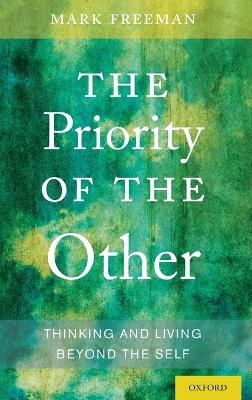
The Priority of the Other
Thinking and Living Beyond the Self
Seiten
2014
Oxford University Press Inc (Verlag)
978-0-19-975930-9 (ISBN)
Oxford University Press Inc (Verlag)
978-0-19-975930-9 (ISBN)
The Priority of the Other provides radical reorientation of our most basic ways of making sense of the human condition. By thinking and being Otherwise, he suggests, we can become better attuned to both the world beyond us and the world within.
Psychology, having come of age under the influence of Descartes and other champions of the thinking "I," has come to focus largely on what happens inside the self. This perspective expanded with the emergence of social psychology and, more recently, cultural psychology, but by and large, the field has taken an essentially ego-centric approach. Working from this basic premise, Mark Freeman proposes that we adopt a more "ex-centric" perspective, one that affirms the priority of the Other in shaping human experience. In speaking of the "Other," Freeman refers not only to other people, but also to those non-human "others," nature, art, God, that take us beyond the ego and bring us closer to the world. In speaking of the Other's priority, he insists that there is much in life that "comes before us." By thinking and living the priority of the Other, we can therefore become better attuned to both the world beyond us and the world within.
At the heart of Freeman's perspective are two fundamental ideas. The first is that the Other is the primary source of meaning, inspiration, and existential nourishment. The second is that it is the primary source of our ethical energies, and that being responsive and responsible to the world beyond us is a defining feature of our humanity. There is a tragic side to Freeman's story, however. Enraptured though we may be by the Other, we frequently encounter it in a state of distraction and fail to receive the nourishment and inspiration it can provide. And responsive and responsible though we may sometimes be, it is perilously easy to retreat inward, to the needy ego. The challenge, therefore, is to break the spell of the "ordinary oblivion" that characterizes much of everyday life. The Priority of the Other can help us rise to the occasion.
Psychology, having come of age under the influence of Descartes and other champions of the thinking "I," has come to focus largely on what happens inside the self. This perspective expanded with the emergence of social psychology and, more recently, cultural psychology, but by and large, the field has taken an essentially ego-centric approach. Working from this basic premise, Mark Freeman proposes that we adopt a more "ex-centric" perspective, one that affirms the priority of the Other in shaping human experience. In speaking of the "Other," Freeman refers not only to other people, but also to those non-human "others," nature, art, God, that take us beyond the ego and bring us closer to the world. In speaking of the Other's priority, he insists that there is much in life that "comes before us." By thinking and living the priority of the Other, we can therefore become better attuned to both the world beyond us and the world within.
At the heart of Freeman's perspective are two fundamental ideas. The first is that the Other is the primary source of meaning, inspiration, and existential nourishment. The second is that it is the primary source of our ethical energies, and that being responsive and responsible to the world beyond us is a defining feature of our humanity. There is a tragic side to Freeman's story, however. Enraptured though we may be by the Other, we frequently encounter it in a state of distraction and fail to receive the nourishment and inspiration it can provide. And responsive and responsible though we may sometimes be, it is perilously easy to retreat inward, to the needy ego. The challenge, therefore, is to break the spell of the "ordinary oblivion" that characterizes much of everyday life. The Priority of the Other can help us rise to the occasion.
Professor of Psychology, Distinguished Professor of Ethics and Society, College of the Holy Cross
Introduction. Thinking and Being Otherwise ; Chapter One. From Self to Other ; Chapter Two. Oblivion and Attention ; Chapter Three. For the Other ; Chapter Four. Beyond the Human ; Chapter Five. The Possibility of Transcendence ; Chapter Six. Living Ex-Centrically ; References
| Verlagsort | New York |
|---|---|
| Sprache | englisch |
| Maße | 236 x 152 mm |
| Gewicht | 476 g |
| Themenwelt | Geisteswissenschaften ► Philosophie |
| Geisteswissenschaften ► Psychologie ► Allgemeine Psychologie | |
| Geisteswissenschaften ► Psychologie ► Sozialpsychologie | |
| Geisteswissenschaften ► Psychologie ► Verhaltenstherapie | |
| Naturwissenschaften | |
| ISBN-10 | 0-19-975930-8 / 0199759308 |
| ISBN-13 | 978-0-19-975930-9 / 9780199759309 |
| Zustand | Neuware |
| Informationen gemäß Produktsicherheitsverordnung (GPSR) | |
| Haben Sie eine Frage zum Produkt? |
Mehr entdecken
aus dem Bereich
aus dem Bereich
Techniken der Verhaltenstherapie
Buch (2024)
Julius Beltz GmbH & Co. KG (Verlag)
CHF 48,95


